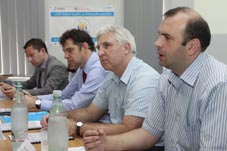UNICEF applaud social assistance but demand more for Georgia's poor
By Etuna Tsotniashvili
Wednesday, July 20

“The Ministry of Labor, Health and Social Affairs should be pleased with the findings of the study; and UNICEF congratulates the Social Service Agency for its positive impact on the most vulnerable families in Georgia,” said Roeland Monasch, UNICEF Representative in Georgia. “However, there are some remaining challenges. 28% of children in Georgia still live in poverty and the government has developed a system of assistance through pensions, cash assistance and health insurance among other things. At UNICEF we found that some families were not receiving the services so we did a survey among a thousand of the poorest households in Georgia,” Monasch told The Messenger adding that UNICEF were, overall, quite impressed with the evaluation. However, they would like to see the budget increased so that more families can be covered by this assistance, especially those with children who are not benefitting from pensions.
“We pay close attention to the results of the presented survey. I would like to underline that the state permanently overviews the social package by which the state ensures its population as cordially to economic development it is necessary to monitor this package and react adequately,” Irakli Nadareishvili, Head of the Social Service Agency said.
Reportedly, 24% of poor families in Georgia have not yet applied to the database. Many of these families don’t know how to apply, or are misinformed about the procedures. The problem is present in ethnic minorities as well and one of the obstacles according to the survey was not having sufficient knowledge of the Georgian language as well as refusal to contact official structures and a lack of information.
However a survey carried out amongst the poorest 20 per cent of households in Georgia revealed some very positive findings. Based on the survey 96 per cent of poor families have heard about the united database of socially unprotected families being the mechanism used by the Government to distribute cash assistance and health insurance. Over 75 per cent of those that have heard about the database of socially unprotected families have applied.
Significantly, from those asked only 4 per cent of those that applied experienced any delay. 79 per cent of respondents rated the Social Service Agency’s work as ‘Normal’, ‘Good’ or ‘Very Good’ – including those who were assessed but did not qualify to receive benefits.
For those that qualify for health insurance, they were satisfied with the coverage and services provided.
The report highlights that the free health insurance programme for the poor is effective, and should be expanded. 58 per cent of the families report that they have health insurance. Three quarters of them report that they would not have been able to cover the cost of recent treatment in the absence of insurance. The main barrier to access health services is related to cost. The second challenge, much less than cost, is related to physical distance to a health facility. The burden of health related costs falls very heavily on those uninsured.
“The Government of Georgia runs a highly effective system,” Roeland Monasch said. “However the socio-economic situation of the majority of families that applied to the database was rated above the ‘cut-off’ score to receive cash assistance (about 66 per cent) and a third did not qualify for health insurance. UNICEF recommends that the Government considers elevating the ‘cut-off score’ to increase the reach and impact of social benefits,” he concluded.
Other recommendations include the increase of representation of families with children in the social benefit system as these families are less likely to benefit from the universal pension system. This would also positively impact on the broader child care reform process as families with children receiving social benefits will be less likely to place their children in residential institutions. An information awareness campaign to ensure every family in Georgia knows where and how to apply, with outreach to particularly difficult to reach areas is also recommended.
“This survey has big importance for us as it is necessary to know what kind of barriers the people face while contacting social service. All those recommendations which are presented today will become part of our action plan which aims all our services to be easily affordable for our population,” Andrew Urushadze, Minister of Labour, Health and Social Affairs of Georgia stated.
Over the last six months, UNICEF, with the support of USAID, studied the effectiveness of the targeted social assistance programme.
